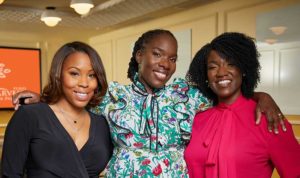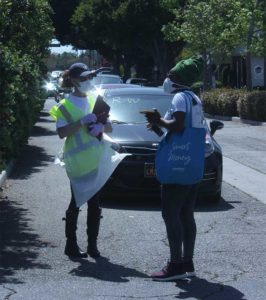‘Everyone wins’
‘Everyone wins’
New programs offer COVID-19 pop-up, drive-through testing sites along with telehealth services to serve underrepresented communities

Drs. Briana DeCuir, Nana Afoh-Manin, Joanne Moreau
Photo credit: Rocco Ceselin
Nana Afoh-Manin ’08M (MD) is an emergency room physician at Kaiser Permanente in Los Angeles—a city hit hard by the pandemic. Every day, she draws on what she learned at medical school, to treat the whole person. This means addressing acute health issues while considering a patient’s surrounding circumstances and socioeconomic conditions—all of which contribute to illness and healing.
She and two medical school classmates—Joanne Moreau ’07M (MD) and Briana DeCuir ’03, ’07M (MD) just launched a new initiative to help under-resourced communities during the pandemic. This initiative—myCovidMD®—offers pop-up, drive-through COVID-19 testing sites along with follow up telehealth medical services for those who need them most through a convenient mobile app.
The founders say that these programs are deeply rooted in the School of Medicine and Dentistry’s biopsychosocial model. They also underscore that their programs reduce patient crowds at hospitals, decrease provider burn-out, and help keep hospitals and patients safe.
“We offer the uninsured and underinsured much-needed access to experts, information, and resources,” she says, noting that these programs benefit medical professionals, too. “Helping others through volunteering is a proven way to decrease anxiety and increase well-being. Everyone wins with these programs.”
To date, the group has held three pop-up, drive-through testing events in Los Angeles, testing approximately 300 people in the process. In the coming weeks, the group will ramp up to host additional testing pop-up drive-thru events in Los Angeles, California, as well as Queens, New York, and Detroit, Michigan, with more to come.
How it works
At each site, community members stay in their cars while moving through various stations. Volunteers greet each car, outline the process, and provide paperwork, including consent forms. They make sure that people understand the myCovidMD® website and app, and the opportunities they will have for follow up telehealth appointments with trained medical professionals.
Those in the drive-through receive a health screening by volunteer medical professionals. They are then finger prick tested for the virus and the presence of antibodies. The testing stations run behind the backdrop of a live DJ with soothing music and poetry. After the test is complete, a volunteer walks each person’s blood work over to an onsite pop-up lab, which processes the results immediately.
As people are discharged, they are reminded of the test result notification process. If a test is negative, the person will receive an email or text within 24 hours, with information reminding them of how to access their free telehealth visits. If a test is positive, a volunteer CHP (Community Health Partner) will call that person within 12 hours and provide immediate next steps.
It takes a village

Volunteers at a recent pop-up, drive-through testing event Photo credit: Orlando Leon
In addition to people volunteering their health care expertise, services, and time, a number of businesses are also helping. For instance, at the group’s last pop-up drive thru in Los Angeles, a local CSA gave grocery bags full of food to every car.
“Community members were thrilled and surprised,” says Dr. Afoh-Manin. “So many people are getting what they need here—health care as well as food, which is also a struggle for them to get right now.”
“We have other businesses helping out, too,” she adds. “To support frontline health care staff—and that includes every type of worker, from the janitor to the surgeon—they are offering meals; flowers; services like babysitting and dog-walking; and even meditation sessions. Collaboration with business partners help facilitate getting these services to our network.
How it started
The two new COVID-19 programs are offered through Shared Harvest, a social entrepreneurial venture the three physicians started less than three years ago. Shared Harvest aligns medical and other professionals with volunteer opportunities, which creates a unique way for them to pay down their student loan debt in the process. “It’s a model similar to what you see with the Peace Corps and the military,” says Dr. Afoh-Manin. “But, our approach serves local communities.”
Shared Harvest partners with lending organizations to coordinate debt-relief programs. The group also works with individual donors and companies with strong corporate responsibility programs to provide funding as well as in-kind donations, including equipment, technology, and COVID-19 tests.
“It’s heartening to see so many people step up to do the right thing for someone else,” says Dr. Afoh-Manin. “We would love for URMC students and alumni to join us as volunteers and donors, and additional information can be found at covidmd.org.”
We all can do something to help. Consider donating supplies or food, giving blood (URMC is facing a critical shortage), making a gift to our COVID-19 emergency fund or support our student emergency fund.
— Kristine Thompson, April 2020


